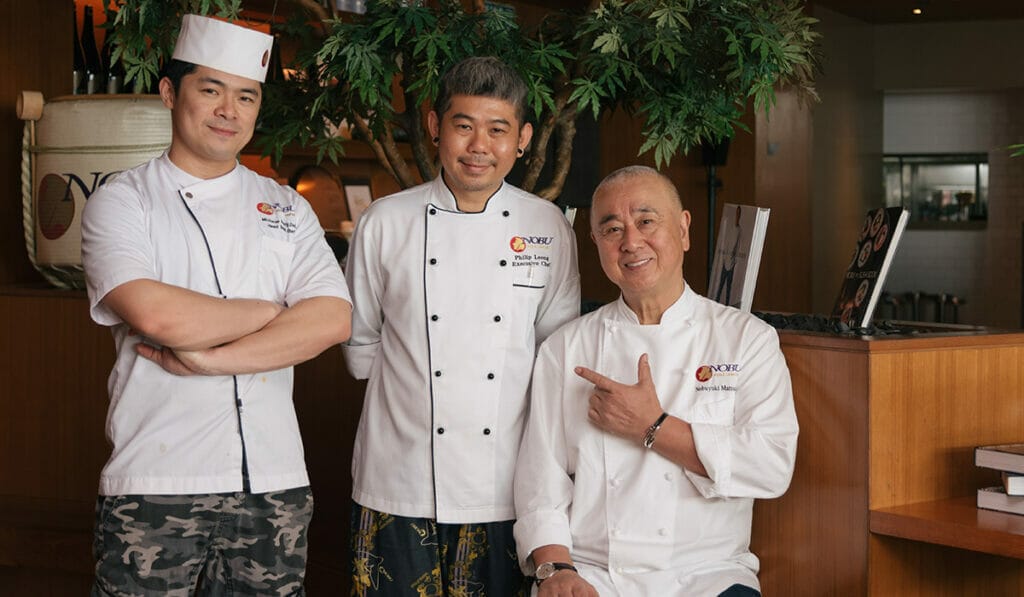Chef Nobu Matsuhisa is one of the world’s most widely acclaimed restaurateurs. When news broke that he would open his first Nobu restaurant in Southeast Asia here in Kuala Lumpur in 2015, many were enthusiastic and eager to try his fusion cuisine that blends traditional Japanese dishes with Peruvian ingredients. Most notably this signature dish, the black cod in miso.
Chef Nobu returned to Nobu Kuala Lumpur (Nobu KL) from 29 September to 1 October for his annual visit. To celebrate the occasion Nobu KL launched an elegant 7-course dining experience for the month of October with the Ode to Nobu Omakase menu crafted by Chef Nobu alongside Executive Chef Philip Leong and the Nobu KL team.
The Peak managed to catch the celebrity chef during his visit and managed to ask him about his cooking philosophy, why he loves to cook and what is in the next big step for Nobu KL.
Could you take us through how you collaborated with Chef Philip Leong to create the outstanding Ode To Nobu Omakase menu to mark your return to Kuala Lumpur.
Chef Nobu: I would say that this menu was largely put together by Chef Philip and it contains a mix of local ingredients and products used together with Nobu standard food.
When I arrived in Kuala Lumpur, Chef Phillip showed me the Omakase (a phrase used in Japanese dining restaurants where the customer leaves it up to the chef to serve seasonal specialities) menu and I provided my input, advising them on making subtle changes to the dishes.
To be honest, I did not make too many changes to his menu as I respect his creative vision.
I don’t usually fix the menu proposed by the local Chef. Instead, I like to improvise together with them to improve upon the dishes and menu as a whole.
Part of the reason why I am travelling around the world is that I would like to introduce the next generation of chefs in my restaurants like Chef Philip Leong. I’m trying not to be so heavily involved and allow the younger chefs to take the wheel and run with their creativity.
Overall, I am pleased with the feedback we have received from customers who have tried the Ode to Nobu Omakase menu.
It has been an honour working with Chef Philip Leong for the past 15 years and I am proud of how he has mastered the art of preparing Japanese food and brought this knowledge to Nobu KL. It brings me a great sense of satisfaction and joy every time I visit Kuala Lumpur.
Chef Philip: We always change our menu with different Omakase menus every month. We went back to the basics and sought to bring out something new with this omakase menu.
This is reflected in our first course, Caviar Santenori where we include a Salmon Sashimi Topped with Caviar. In truth, this is a very basic Nobu Style dish but we added a twist with our Nori Taco with Uni and Caviar. What we did was enhance the original dish by using Nori seaweed instead of a tortilla to lend a Japanese influence to the dish.
At Nobu KL, we place a lot of emphasis on using premium ingredients but we also like to support local suppliers at the same time by using their caviar on our signature dishes. For our Caviar Santenori, we actually source caviar from a local sturgeon farm in Tanjung Malim, Perak.
Finally, for the dessert, we have a very Japanese inspired dish called Soya Panna Cotta on Monaka and Monk Fruit Sorbet. Using soya milk and cream, we create the Panna Cotta and place it on the Monaka wafer, this pairs perfectly with the Monk Fruit Sorbet, a unique ingredient that Chef Nobu loves to use.

How would you describe your taste journey and how you have conceptualised your dishes by merging Japanese cuisine with local flavours over the years?Â
I would say that Nobu Style food is not like traditional Japanese food. It may share flavours and ingredients that you may find in normal Japanese food but I am not averse to using non-traditional ingredients like chillis, olive oil and tomatoes in my cooking.
Now that we have restaurants in 5 different continents. I like to do something different in each country and try to cater the food to local tastes by using ingredients that are indigenous to the country.
For example, I would combine basic Japanese food while supplementing it with local products and ingredients to create Nobu Style food.
In this regard, Nobu Style food all over the world is constantly changing and evolving into something new, exciting and inspiring.
Nobu restaurants are all over the world but how do you distinguish each restaurant from New York, London to Kuala Lumpur to have a unique identity. Do you leave it to your next-generation chefs to advise you on how to come up with some of the localised dishes?Â
I spend a lot of time travelling, in fact, I spend 10 months a year flying all around the world to visit my various restaurants. I normally stay in each location for about three days where I spend most of the time with my chefs.
During my visit, I will stay with them and get updates from them on the food being served while introducing new dishes. I always taste my signature dishes in all my restaurants to ensure quality and consistency.
But apart from that, I encourage each of my chefs in each restaurant to create their own dish. I ask them to uses local ingredients and flavours that are unique to that country to give their dishes a distinctive taste you can’t find anywhere else in the world.
To me, presentation is not everything. Even a simple presentation has a lot of energy. You can make a good looking dish but if you don’t cook it with your heart (or “Kokoro†in Japanese), it will not taste good and not make people happy.
That is why most of the time I do not train my chefs to be great technically. Every time I visit and stay with my chefs I explain my philosophy to them, “To always cook with your heartâ€.
Being a Japanese restaurant, sushi features prominently in Nobu KL menu. What makes the sushi in Nobu so unique and delicious?
Sushi is mainly divided into two main components the sushi rice and the fish itself. Traditional sushi rice is made using rice vinegar, sugar and salt.
At Nobu, I have changed things by taking out the sugar and use monk fruit, which originates from China, as a substitute. It is sweet but as there is no sugar, the sushi is healthier to eat especially for health-conscious diners.
Good sushi is also dependent on the quality of the fish used. At Nobu, we always pick out the best fish and freshest catches of the day. I always tell my sushi chefs to master the art of picking out the best fishes from the market each day to ensure top-quality sushi.
My technique for making sushi involves using all ten of my fingers. It is a very delicate yet simple process, but it is also very difficult to master. The trick is you need to firmly but gently shape the sushi with the sushi rice to the point you can still see light passing through the sushi.
Even so, the technique for me isn’t everything. What is more important is making sushi with feeling and my heart.
What is your favourite flavour to use in dishes?
Nobu is Japanese food but I tend to use unique ingredients that I make myself. For example, dried miso. Miso is traditionally used as a soup paste but I make a dried version of it and use it in my salads and also with sashimi.
Normally, you would eat sashimi with soy sauce and wasabi but I replace these with dry miso to give it a unique flavour you won’t find anywhere else.
This ingredient is unique to Nobu restaurants and it is also my favourite.
Nobu KL is the 31st outlet and first in Southeast Asia. In your eyes how has the restaurant performed over the last 5 years? Are you satisfied and is there anything that you would like to change?
Nobu KL has been in operation for nearly five years now and the business has been growing steadily. I am proud to say that we have established a strong local team here and have a good relationship with our partners and customers here.
But moving on to the next step we will be moving to a new location. Admittedly, opening a restaurant in a new location isn’t an easy task but I believe the local team is ready as the chefs and management team is highly competent.
It is my hope the new restaurant will produce more inspiring Nobu style food that will continue please our customers and attract new ones.
Will you be opening more restaurants in the coming year?
In Asia, we don’t have any plans to expand our restaurants. We are still in discussions with certain parties but I can’t disclose any details just yet.
However, I can say that we have opened new hotels and restaurants in Spain and Mexico. In addition, we are also opening a new hotel and restaurant in Portman Square, London.
Finally, how would you describe your business philosophy?
My business philosophy is very simple. Always try my best to run the restaurant business. Provide good quality food and service. Always look into the details and stay passionate.



